Abstract
Recent studies have suggested that insulin-like growth factors (IGFs) and insulin-like growth factor binding proteins (IGFBPs) may be implicated in the development and progression of breast cancer. Prostate-specific antigen (PSA), a serine protease, may play a role in the regulation of IGFs' function through cleavage of IGFBP-3, resulting in release of active IGFs from IGFBP-3. As IGFs, IGFBPs and PSA are all present in breast cancer, possible associations among these proteins were speculated. In this study, we have measured PSA, IGF-I, IGF-II, IGFBP-1 and IGFBP-3 in tumour tissue cytosols from 200 women with primary breast cancer, and have examined relationships between IGFs or IGFBPs and PSA along with other markers, including p53 protein, steroid hormone receptors (oestrogen and progesterone), cathepsin-D, epidermal growth factor receptor, Her-2/neu protein, S-phase fraction and DNA ploidy. Correlations or associations between PSA and IGF-I, IGF-II, IGFBP-1 or IGFBP-3 were not observed. IGF-II was positively correlated with both IGFBP-3 and IGFBP-1. IGF-I was not associated with either of the two binding proteins, nor with IGF-II. Both IGF-II and IGFBP-3 were inversely associated with the oestrogen receptor, and IGFBP-3 was also positively associated with S-phase fraction. Our finding of IGF-II and IGFBP-3 in association with unfavourable prognostic indicators of breast cancer suggests that IGFs may be involved in the progression of breast cancer.
Full text
PDF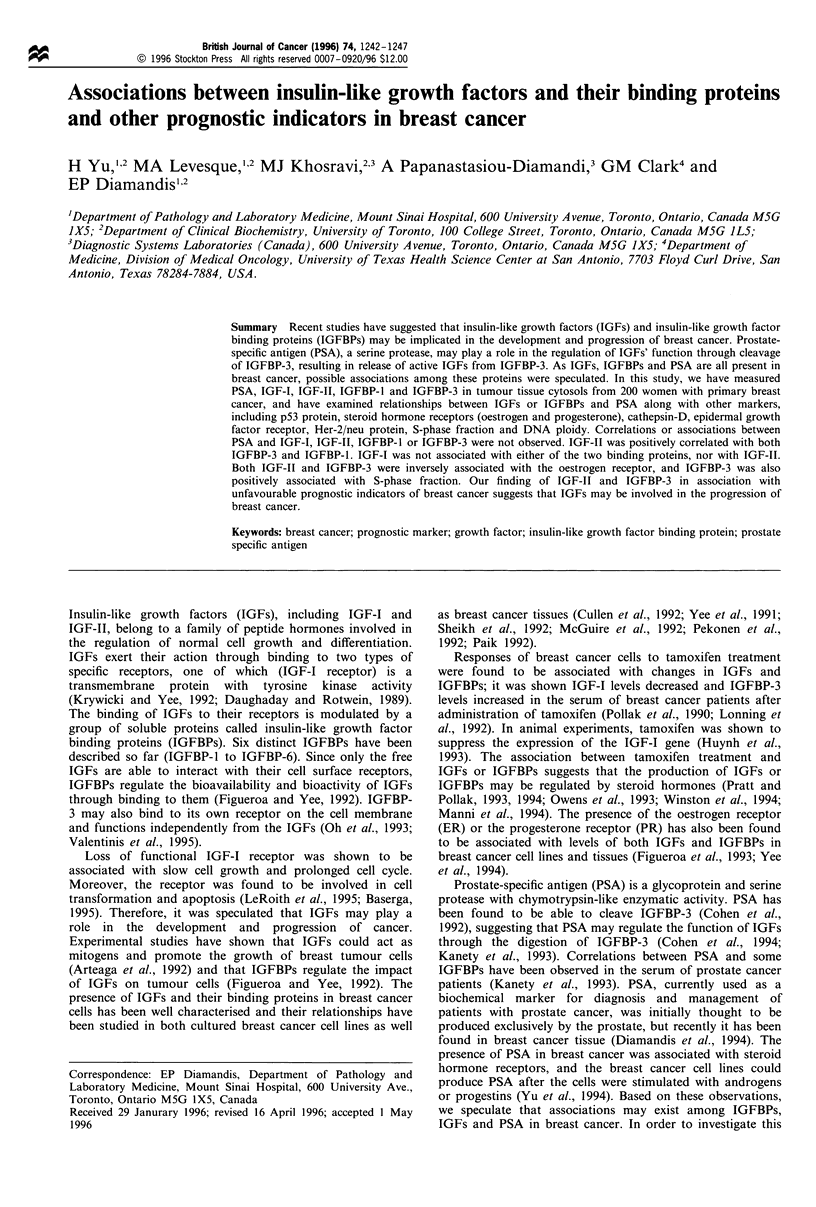
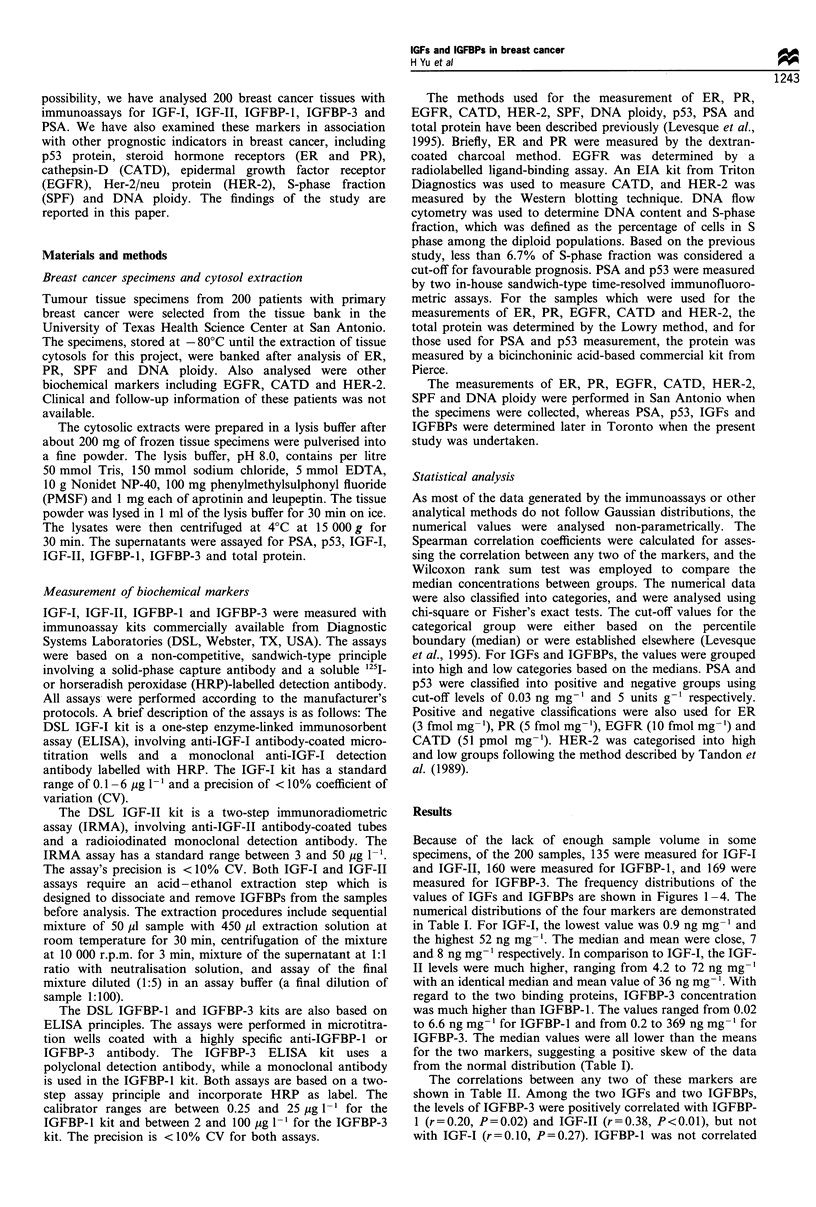
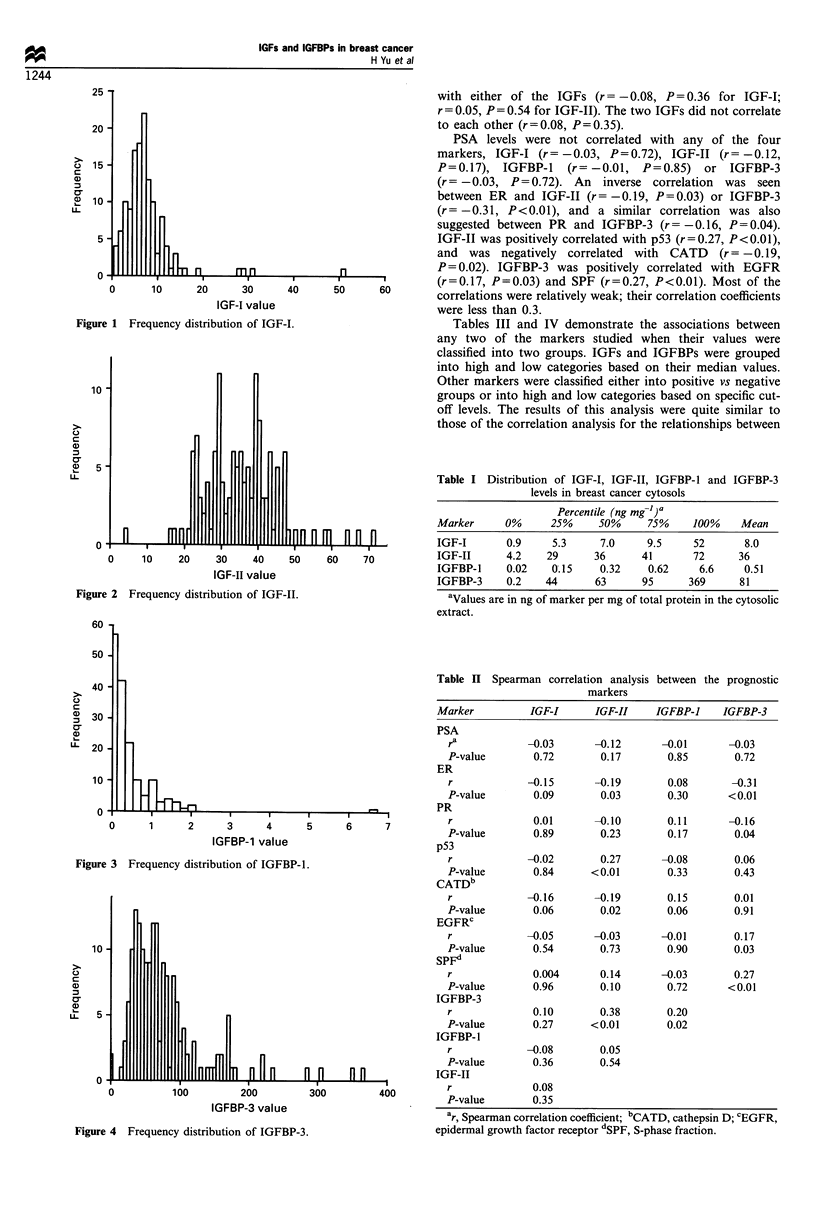
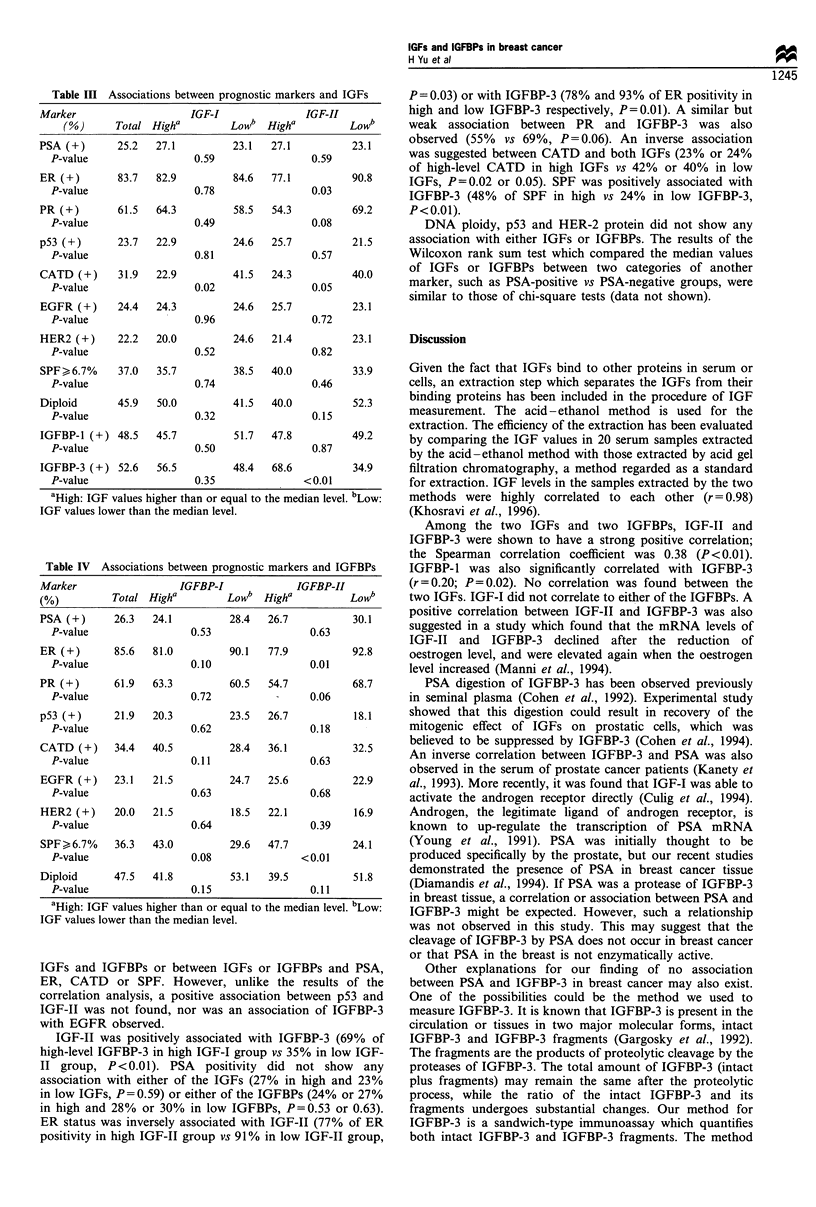
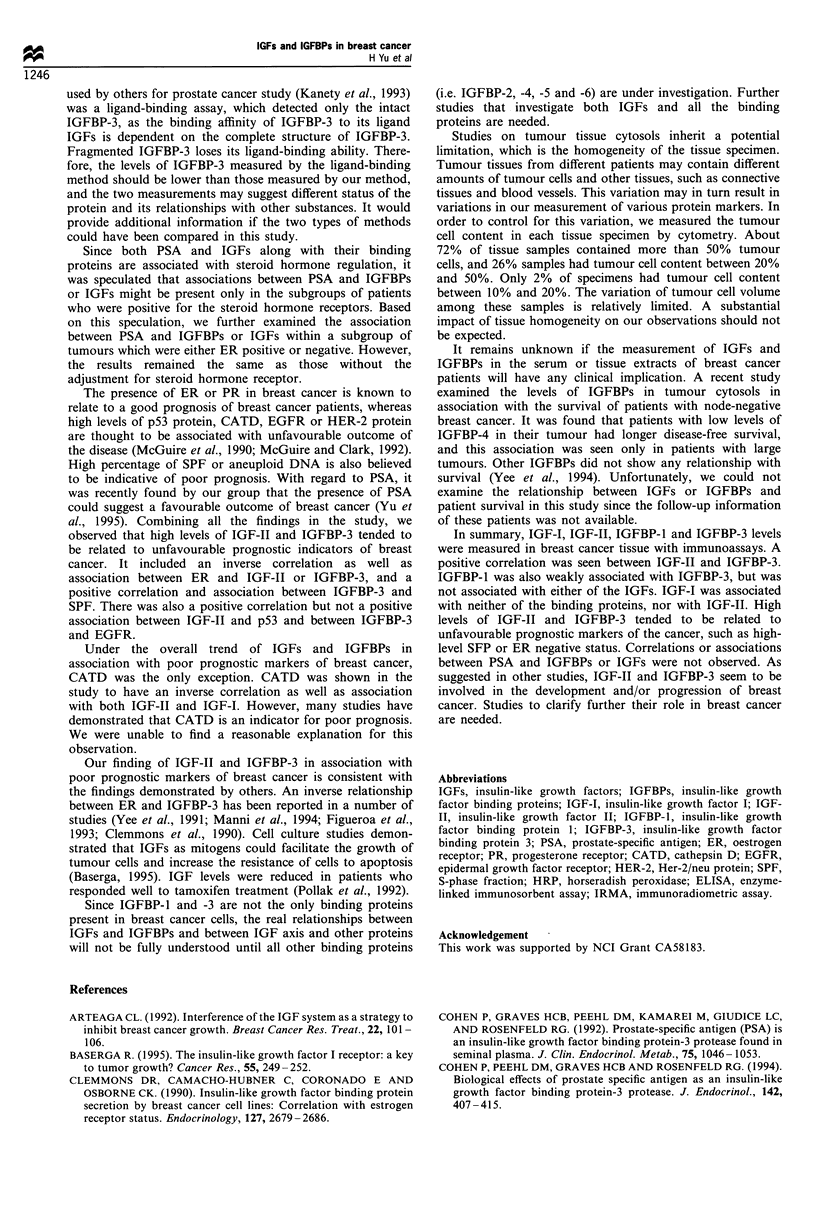
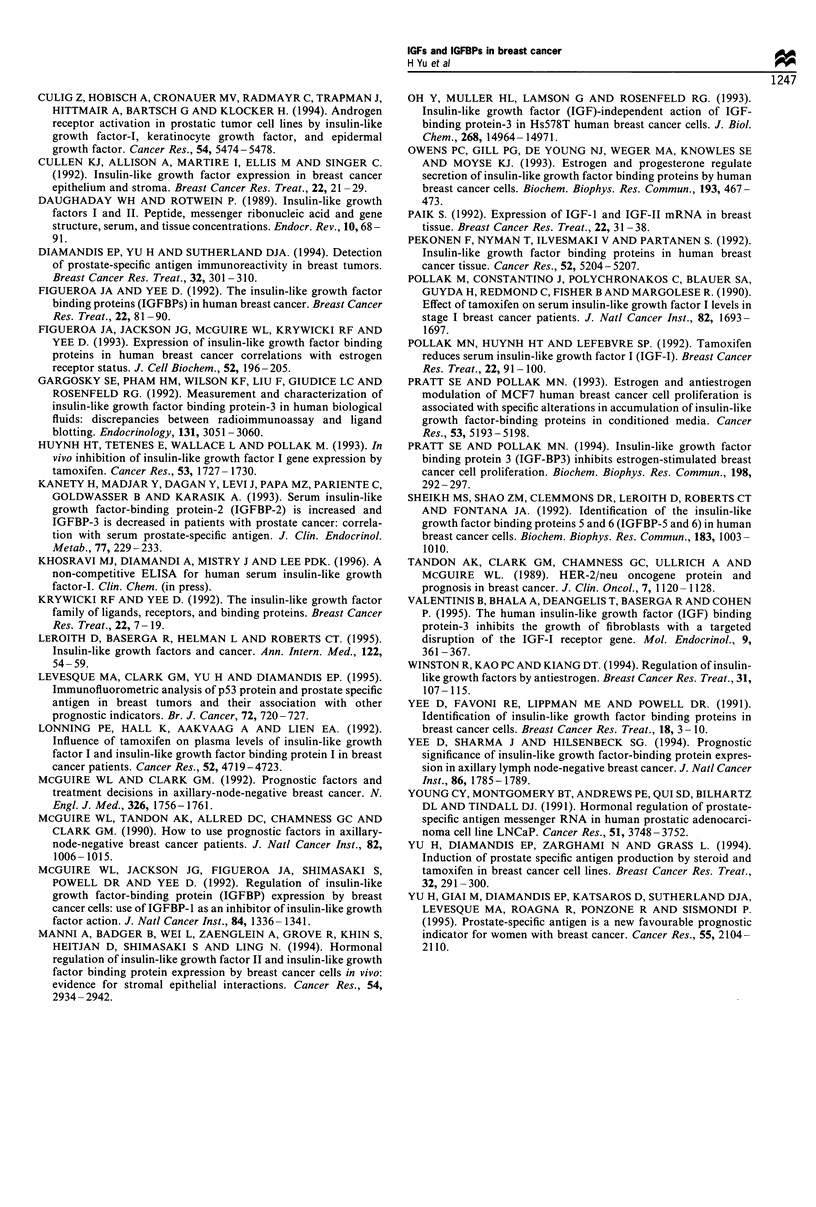
Selected References
These references are in PubMed. This may not be the complete list of references from this article.
- Arteaga C. L. Interference of the IGF system as a strategy to inhibit breast cancer growth. Breast Cancer Res Treat. 1992;22(1):101–106. doi: 10.1007/BF01833338. [DOI] [PubMed] [Google Scholar]
- Baserga R. The insulin-like growth factor I receptor: a key to tumor growth? Cancer Res. 1995 Jan 15;55(2):249–252. [PubMed] [Google Scholar]
- Clemmons D. R., Camacho-Hubner C., Coronado E., Osborne C. K. Insulin-like growth factor binding protein secretion by breast carcinoma cell lines: correlation with estrogen receptor status. Endocrinology. 1990 Dec;127(6):2679–2686. doi: 10.1210/endo-127-6-2679. [DOI] [PubMed] [Google Scholar]
- Cohen P., Graves H. C., Peehl D. M., Kamarei M., Giudice L. C., Rosenfeld R. G. Prostate-specific antigen (PSA) is an insulin-like growth factor binding protein-3 protease found in seminal plasma. J Clin Endocrinol Metab. 1992 Oct;75(4):1046–1053. doi: 10.1210/jcem.75.4.1383255. [DOI] [PubMed] [Google Scholar]
- Cohen P., Peehl D. M., Graves H. C., Rosenfeld R. G. Biological effects of prostate specific antigen as an insulin-like growth factor binding protein-3 protease. J Endocrinol. 1994 Sep;142(3):407–415. doi: 10.1677/joe.0.1420407. [DOI] [PubMed] [Google Scholar]
- Culig Z., Hobisch A., Cronauer M. V., Radmayr C., Trapman J., Hittmair A., Bartsch G., Klocker H. Androgen receptor activation in prostatic tumor cell lines by insulin-like growth factor-I, keratinocyte growth factor, and epidermal growth factor. Cancer Res. 1994 Oct 15;54(20):5474–5478. [PubMed] [Google Scholar]
- Cullen K. J., Allison A., Martire I., Ellis M., Singer C. Insulin-like growth factor expression in breast cancer epithelium and stroma. Breast Cancer Res Treat. 1992;22(1):21–29. doi: 10.1007/BF01833330. [DOI] [PubMed] [Google Scholar]
- Daughaday W. H., Rotwein P. Insulin-like growth factors I and II. Peptide, messenger ribonucleic acid and gene structures, serum, and tissue concentrations. Endocr Rev. 1989 Feb;10(1):68–91. doi: 10.1210/edrv-10-1-68. [DOI] [PubMed] [Google Scholar]
- Diamandis E. P., Yu H., Sutherland D. J. Detection of prostate-specific antigen immunoreactivity in breast tumors. Breast Cancer Res Treat. 1994;32(3):301–310. doi: 10.1007/BF00666007. [DOI] [PubMed] [Google Scholar]
- Figueroa J. A., Jackson J. G., McGuire W. L., Krywicki R. F., Yee D. Expression of insulin-like growth factor binding proteins in human breast cancer correlates with estrogen receptor status. J Cell Biochem. 1993 Jun;52(2):196–205. doi: 10.1002/jcb.240520211. [DOI] [PubMed] [Google Scholar]
- Figueroa J. A., Yee D. The insulin-like growth factor binding proteins (IGFBPs) in human breast cancer. Breast Cancer Res Treat. 1992;22(1):81–90. doi: 10.1007/BF01833336. [DOI] [PubMed] [Google Scholar]
- Gargosky S. E., Pham H. M., Wilson K. F., Liu F., Giudice L. C., Rosenfeld R. G. Measurement and characterization of insulin-like growth factor binding protein-3 in human biological fluids: discrepancies between radioimmunoassay and ligand blotting. Endocrinology. 1992 Dec;131(6):3051–3060. doi: 10.1210/endo.131.6.1280211. [DOI] [PubMed] [Google Scholar]
- Huynh H. T., Tetenes E., Wallace L., Pollak M. In vivo inhibition of insulin-like growth factor I gene expression by tamoxifen. Cancer Res. 1993 Apr 15;53(8):1727–1730. [PubMed] [Google Scholar]
- Kanety H., Madjar Y., Dagan Y., Levi J., Papa M. Z., Pariente C., Goldwasser B., Karasik A. Serum insulin-like growth factor-binding protein-2 (IGFBP-2) is increased and IGFBP-3 is decreased in patients with prostate cancer: correlation with serum prostate-specific antigen. J Clin Endocrinol Metab. 1993 Jul;77(1):229–233. doi: 10.1210/jcem.77.1.7686915. [DOI] [PubMed] [Google Scholar]
- Krywicki R. F., Yee D. The insulin-like growth factor family of ligands, receptors, and binding proteins. Breast Cancer Res Treat. 1992;22(1):7–19. doi: 10.1007/BF01833329. [DOI] [PubMed] [Google Scholar]
- LeRoith D., Baserga R., Helman L., Roberts C. T., Jr Insulin-like growth factors and cancer. Ann Intern Med. 1995 Jan 1;122(1):54–59. doi: 10.7326/0003-4819-122-1-199501010-00009. [DOI] [PubMed] [Google Scholar]
- Levesque M. A., Clark G. M., Yu H., Diamandis E. P. Immunofluorometric analysis of p53 protein and prostate-specific antigen in breast tumours and their association with other prognostic indicators. Br J Cancer. 1995 Sep;72(3):720–727. doi: 10.1038/bjc.1995.400. [DOI] [PMC free article] [PubMed] [Google Scholar]
- Lønning P. E., Hall K., Aakvaag A., Lien E. A. Influence of tamoxifen on plasma levels of insulin-like growth factor I and insulin-like growth factor binding protein I in breast cancer patients. Cancer Res. 1992 Sep 1;52(17):4719–4723. [PubMed] [Google Scholar]
- Manni A., Badger B., Wei L., Zaenglein A., Grove R., Khin S., Heitjan D., Shimasaki S., Ling N. Hormonal regulation of insulin-like growth factor II and insulin-like growth factor binding protein expression by breast cancer cells in vivo: evidence for stromal epithelial interactions. Cancer Res. 1994 Jun 1;54(11):2934–2942. [PubMed] [Google Scholar]
- McGuire W. L., Clark G. M. Prognostic factors and treatment decisions in axillary-node-negative breast cancer. N Engl J Med. 1992 Jun 25;326(26):1756–1761. doi: 10.1056/NEJM199206253262607. [DOI] [PubMed] [Google Scholar]
- McGuire W. L., Jr, Jackson J. G., Figueroa J. A., Shimasaki S., Powell D. R., Yee D. Regulation of insulin-like growth factor-binding protein (IGFBP) expression by breast cancer cells: use of IGFBP-1 as an inhibitor of insulin-like growth factor action. J Natl Cancer Inst. 1992 Sep 2;84(17):1336–1341. doi: 10.1093/jnci/84.17.1336. [DOI] [PubMed] [Google Scholar]
- McGuire W. L., Tandon A. K., Allred D. C., Chamness G. C., Clark G. M. How to use prognostic factors in axillary node-negative breast cancer patients. J Natl Cancer Inst. 1990 Jun 20;82(12):1006–1015. doi: 10.1093/jnci/82.12.1006. [DOI] [PubMed] [Google Scholar]
- Oh Y., Müller H. L., Lamson G., Rosenfeld R. G. Insulin-like growth factor (IGF)-independent action of IGF-binding protein-3 in Hs578T human breast cancer cells. Cell surface binding and growth inhibition. J Biol Chem. 1993 Jul 15;268(20):14964–14971. [PubMed] [Google Scholar]
- Owens P. C., Gill P. G., De Young N. J., Weger M. A., Knowles S. E., Moyse K. J. Estrogen and progesterone regulate secretion of insulin-like growth factor binding proteins by human breast cancer cells. Biochem Biophys Res Commun. 1993 Jun 15;193(2):467–473. doi: 10.1006/bbrc.1993.1647. [DOI] [PubMed] [Google Scholar]
- Paik S. Expression of IGF-I and IGF-II mRNA in breast tissue. Breast Cancer Res Treat. 1992;22(1):31–38. doi: 10.1007/BF01833331. [DOI] [PubMed] [Google Scholar]
- Pekonen F., Nyman T., Ilvesmäki V., Partanen S. Insulin-like growth factor binding proteins in human breast cancer tissue. Cancer Res. 1992 Oct 1;52(19):5204–5207. [PubMed] [Google Scholar]
- Pollak M. N., Huynh H. T., Lefebvre S. P. Tamoxifen reduces serum insulin-like growth factor I (IGF-I). Breast Cancer Res Treat. 1992;22(1):91–100. doi: 10.1007/BF01833337. [DOI] [PubMed] [Google Scholar]
- Pollak M., Costantino J., Polychronakos C., Blauer S. A., Guyda H., Redmond C., Fisher B., Margolese R. Effect of tamoxifen on serum insulinlike growth factor I levels in stage I breast cancer patients. J Natl Cancer Inst. 1990 Nov 7;82(21):1693–1697. doi: 10.1093/jnci/82.21.1693. [DOI] [PubMed] [Google Scholar]
- Pratt S. E., Pollak M. N. Estrogen and antiestrogen modulation of MCF7 human breast cancer cell proliferation is associated with specific alterations in accumulation of insulin-like growth factor-binding proteins in conditioned media. Cancer Res. 1993 Nov 1;53(21):5193–5198. [PubMed] [Google Scholar]
- Pratt S. E., Pollak M. N. Insulin-like growth factor binding protein 3 (IGF-BP3) inhibits estrogen-stimulated breast cancer cell proliferation. Biochem Biophys Res Commun. 1994 Jan 14;198(1):292–297. doi: 10.1006/bbrc.1994.1041. [DOI] [PubMed] [Google Scholar]
- Sheikh M. S., Shao Z. M., Clemmons D. R., LeRoith D., Roberts C. T., Jr, Fontana J. A. Identification of the insulin-like growth factor binding proteins 5 and 6 (IGFBP-5 and 6) in human breast cancer cells. Biochem Biophys Res Commun. 1992 Mar 31;183(3):1003–1010. doi: 10.1016/s0006-291x(05)80290-6. [DOI] [PubMed] [Google Scholar]
- Tandon A. K., Clark G. M., Chamness G. C., Ullrich A., McGuire W. L. HER-2/neu oncogene protein and prognosis in breast cancer. J Clin Oncol. 1989 Aug;7(8):1120–1128. doi: 10.1200/JCO.1989.7.8.1120. [DOI] [PubMed] [Google Scholar]
- Valentinis B., Bhala A., DeAngelis T., Baserga R., Cohen P. The human insulin-like growth factor (IGF) binding protein-3 inhibits the growth of fibroblasts with a targeted disruption of the IGF-I receptor gene. Mol Endocrinol. 1995 Mar;9(3):361–367. doi: 10.1210/mend.9.3.7539889. [DOI] [PubMed] [Google Scholar]
- Winston R., Kao P. C., Kiang D. T. Regulation of insulin-like growth factors by antiestrogen. Breast Cancer Res Treat. 1994;31(1):107–115. doi: 10.1007/BF00689681. [DOI] [PubMed] [Google Scholar]
- Yee D., Favoni R. E., Lippman M. E., Powell D. R. Identification of insulin-like growth factor binding proteins in breast cancer cells. Breast Cancer Res Treat. 1991 Mar;18(1):3–10. doi: 10.1007/BF01975437. [DOI] [PubMed] [Google Scholar]
- Yee D., Sharma J., Hilsenbeck S. G. Prognostic significance of insulin-like growth factor-binding protein expression in axillary lymph node-negative breast cancer. J Natl Cancer Inst. 1994 Dec 7;86(23):1785–1789. doi: 10.1093/jnci/86.23.1785. [DOI] [PubMed] [Google Scholar]
- Young C. Y., Montgomery B. T., Andrews P. E., Qui S. D., Bilhartz D. L., Tindall D. J. Hormonal regulation of prostate-specific antigen messenger RNA in human prostatic adenocarcinoma cell line LNCaP. Cancer Res. 1991 Jul 15;51(14):3748–3752. [PubMed] [Google Scholar]
- Yu H., Diamandis E. P., Zarghami N., Grass L. Induction of prostate specific antigen production by steroids and tamoxifen in breast cancer cell lines. Breast Cancer Res Treat. 1994;32(3):291–300. doi: 10.1007/BF00666006. [DOI] [PubMed] [Google Scholar]
- Yu H., Giai M., Diamandis E. P., Katsaros D., Sutherland D. J., Levesque M. A., Roagna R., Ponzone R., Sismondi P. Prostate-specific antigen is a new favorable prognostic indicator for women with breast cancer. Cancer Res. 1995 May 15;55(10):2104–2110. [PubMed] [Google Scholar]


